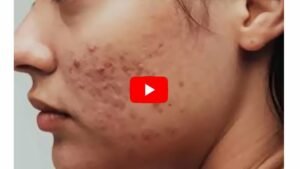1. The Cellular Impact of Diet on Your Skin
Millions of individuals of all ages suffer from acne, one of the most prevalent skin disorders in the world. Although skincare practices, hygiene, and heredity all play a part, nutrition is a significant but frequently disregarded aspect that affects acne. But how exactly does what you eat impact your skin? The complex biological processes that link diet, hormones, and acne flare-ups hold the key to the solution. You can make better food decisions that support clear, healthy skin by being aware of this relationship.
Hormones’ Contribution to the Development of Acne
Understanding the role of hormones in skin health is crucial to understanding how nutrition impacts acne. Hormones are chemical messengers that control many body processes, including the skin’s production of oil. The hormones known as androgens, which include testosterone, are especially important in the development of acne. Elevated androgen levels activate sebaceous glands, causing them to create extra sebum (skin oil). Sebum normally hydrates and protects the skin, but too much of it can clog pores and provide an environment that is conducive to the growth of bacteria that cause acne, such as Cutibacterium acnes.
The Effects of Food on Hormonal Activity
Blood sugar management is the main way that diet directly affects hormonal function. Your blood sugar rises rapidly when you consume foods heavy in simple carbohydrates and refined sugars, such as white bread, candies, and sugary drinks. Insulin, a hormone that aids cells in absorbing sugar for energy, is released by the pancreas in response. High insulin levels, however, cause an increase in androgen production in addition to controlling blood sugar. Increased sebum production, pore blockage, and eventually acne flare-ups are the results of this hormonal cascade.
Further encouraging the proliferation of skin cells and the release of sebum is insulin growth factor-1 (IGF-1), another hormone that is triggered by elevated insulin. Overproduction of IGF-1 can lead to fast cell division in the skin’s outer layer, which raises the possibility of clogged pores.
Inflammation: The Hidden Aggravator
Chronic inflammation is a major factor in acne, which is not just about clogged pores and excess oil. Acne symptoms might be exacerbated by some meals that cause systemic inflammation. Increased inflammatory markers in the body have been associated with diets heavy in processed foods, trans fats, and dairy.
Pimples become red, bloated, and painful due to inflammation, which intensifies the skin’s immune response. It also prolongs the healing process. Conversely, foods high in antioxidants and anti-inflammatory properties, like fruits, vegetables, nuts, and fatty fish, help fight oxidative stress and lower inflammation, which speeds up skin healing and prevents breakouts.
The New Link Between Acne and Gut Health
According to new research, the gut-skin axis—a channel of communication between the skin and the digestive system—may also be impacted by gut health and acne. Increased intestinal permeability, or “leaky gut,” can result from an unbalanced gut microbiome, which is frequently brought on by stress, poor diet, or antibiotic use. This disorder makes it possible for germs and toxins to enter the circulation, which exacerbates skin issues and causes systemic inflammation.
A healthy gut microbiota is supported by eating a diet high in fiber, probiotics (such as yogurt and fermented foods), and prebiotics. This equilibrium may lessen the severity of acne indirectly by regulating immunological responses.
Nutrients That Promote Clear Skin and Hormonal Balance
Skin health can be supported and hormonal activity can be modulated by certain nutrients. For instance, zinc is well-known for its ability to regulate hormones and reduce inflammation. It boosts immunity and lowers sebum production, both of which can help acne lesions recover.
Fatty fish like salmon and mackerel include omega-3 fatty acids, which have strong anti-inflammatory properties that soothe sensitive skin and balance hormones. Antioxidants like vitamins A, C, and E shield skin cells from harm and encourage skin cell renewal.

Practical Dietary Tips to Manage Acne
-
Limit High-Glycemic Foods: Cut back on refined grains, white bread, and sugary snacks. Instead, choose vegetables, legumes, and whole grains.
-
Select Anti-Inflammatory Foods: Make sure your meals include a lot of leafy greens, berries, almonds, and fatty fish.
-
Moderate Dairy Consumption: Although this varies from person to person, some people find that cutting back on milk and cheese helps minimize acne.
-
Consume Probiotic-Rich Foods: Eat yogurt, kefir, and fermented vegetables to support gut health.
-
Stay Hydrated: Water keeps your skin moisturized and aids in the removal of toxins.
Although complicated, there is no denying the biological connection between hormones, diet, and acne. You may make educated dietary decisions to help naturally lessen acne flare-ups by knowing how high-glycemic foods, hormone changes, inflammation, and gut health interact. Healthy eating combined with appropriate skincare and, if necessary, medical advice provides a comprehensive approach to attaining healthier, clearer skin, even though diet alone might not be a panacea.
✅ Struggling with acne? Discover the 2 natural solutions I personally recommend 👉CLICK HERE
2. Important Hormones Affected by Diet (and Their Function in Acne)
Your food plays a critical role in controlling hormones like insulin, androgens, and cortisol—each of which can affect acne development.
After eating, the hormone insulin is released, particularly when high-glycemic foods such refined carbohydrates and sugary snacks are consumed. A jump in insulin encourages the synthesis of androgens, including testosterone, which raise the skin’s production of sebum, or oil. When pores are clogged by excess sebum, bacteria that cause acne can flourish.
The male sex hormones androgens, which are found in both men and women, control the functioning of the oil glands. Elevated androgen levels drive sebaceous glands to create more oil, increasing acne flare-ups. The main cause of androgen rise is diet-induced insulin spikes, which establish a clear link between dietary choices and hormone-driven acne.
What you consume can also affect the stress hormone cortisol. Processed foods and sugary diets can intensify stress reactions and raise cortisol levels. By causing excessive oil production and delaying skin repair, elevated cortisol can exacerbate acne by increasing inflammation.
You can help balance these hormones and lessen the severity of acne by eating nutrient-dense, low-glycemic foods and practicing stress management.
3. The Relationship Between Inflammation, Gut Health, and Skin
Acne is not merely a surface skin condition — it often represents deeper internal imbalances, notably related to inflammation and digestive health. The frequency and intensity of your breakouts are directly impacted by the food you eat, which can either exacerbate or alleviate these underlying causes.
Dietary Inflammation
Certain foods promote systemic inflammation, a chronic, low-grade immune response that can aggravate acne. Diets high in trans fats, processed sweets, refined carbohydrates, and dairy are known to worsen inflammation. When your body is inflamed, immune cells flood the skin to battle perceived threats, causing redness, swelling, and the painful pimples characteristic of acne. Additionally, this inflammatory response interferes with the skin’s normal healing process, making blemishes last longer.
Poor Digestion and Gut Health
The gut-skin axis—the communication network between your gut and skin—is a key factor in skin health. When digestion is compromised by low fiber intake, food sensitivities, or an imbalanced gut microbiome, toxins and undigested food particles can leak through the intestinal lining in a condition called “leaky gut.” These toxins enter the bloodstream, causing systemic inflammation that contributes to acne and other skin problems.
Moreover, poor digestion often leads to nutrient deficiencies in minerals and vitamins essential for skin repair and immune function, such as zinc, vitamins A, and D. Without adequate nutrients, your skin cannot effectively combat inflammation or heal from breakouts.
The Bottom Line
To reduce dietary inflammation and support digestion, focus on whole, anti-inflammatory foods like leafy greens, berries, nuts, fatty fish, and fermented products rich in probiotics. Avoid processed foods and sugars that disrupt your digestive system and promote inflammation. Improving your gut health and minimizing inflammation through diet is one of the most effective ways to achieve clearer, healthier skin.
4. Research-Proven Nutrients for Acne Relief
Zinc: The Skin’s Restorative Mineral
Zinc is one of the most researched nutrients for treating acne due to its critical roles in reducing inflammation, regulating oil production, and boosting immune function. Studies show that zinc supplementation can lessen acne severity by promoting skin repair and inhibiting the growth of acne-causing bacteria. Foods rich in zinc include meat, lentils, oysters, and pumpkin seeds.
Natural Anti-Inflammatory Properties of Omega-3 Fatty Acids
Omega-3 fatty acids, found in fatty fish like salmon and mackerel, as well as flaxseeds and walnuts, have potent anti-inflammatory effects. They help soothe inflamed skin and balance hormone levels that influence acne development by lowering systemic inflammation.
Vitamin A Promotes Skin Cell Turnover
Vitamin A and its derivatives, known as retinoids, accelerate skin cell turnover, preventing clogged pores and promoting clear skin. Consuming vitamin A-rich foods such as leafy greens, sweet potatoes, and carrots supports natural exfoliation and reduces acne risk.
Vitamin D: Regulates the Immune System
Vitamin D deficiency has been linked to increased acne severity. This vitamin helps regulate the immune system and reduce inflammation. Maintaining healthy vitamin D levels through sun exposure and consuming foods like fatty fish, egg yolks, and fortified dairy products supports clearer skin.
✅ Struggling with acne? Discover the 2 natural solutions I personally recommend 👉CLICK HERE






Equilibrado de piezas
El equilibrado representa una fase clave en las tareas de mantenimiento de maquinaria agricola, asi como en la fabricacion de ejes, volantes, rotores y armaduras de motores electricos. El desequilibrio genera vibraciones que aceleran el desgaste de los rodamientos, generan sobrecalentamiento e incluso pueden causar la rotura de los componentes. Para evitar fallos mecanicos, resulta esencial identificar y corregir el desequilibrio de forma temprana utilizando metodos modernos de diagnostico.
Metodos principales de equilibrado
Hay diferentes tecnicas para corregir el desequilibrio, dependiendo del tipo de pieza y la magnitud de las vibraciones:
Equilibrado dinamico – Se utiliza en componentes rotativos (rotores, ejes) y se realiza en maquinas equilibradoras especializadas.
Equilibrado estatico – Se usa en volantes, ruedas y otras piezas donde es suficiente compensar el peso en un unico plano.
La correccion del desequilibrio – Se realiza mediante:
Taladrado (eliminacion de material en la zona mas pesada),
Colocacion de contrapesos (en ruedas, aros de volantes),
Ajuste de masas de equilibrado (por ejemplo, en ciguenales).
Diagnostico del desequilibrio: equipos utilizados
Para detectar con precision las vibraciones y el desequilibrio, se utilizan:
Equipos equilibradores – Permiten medir el nivel de vibracion y definen con precision los puntos de correccion.
Equipos analizadores de vibraciones – Registran el espectro de oscilaciones, identificando no solo el desequilibrio, sino tambien fallos adicionales (como el desgaste de rodamientos).
Sistemas de medicion laser – Se usan para mediciones de alta precision en mecanismos criticos.
Especial atencion merecen las velocidades criticas de rotacion – regimenes en los que la vibracion aumenta drasticamente debido a la resonancia. Un equilibrado correcto previene danos en el equipo bajo estas condiciones.